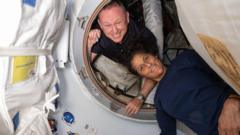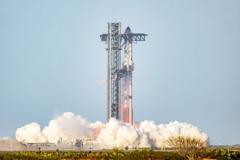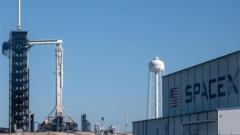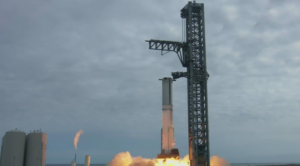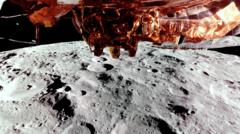NASA's Europa Clipper has launched from Florida to examine Jupiter's moon Europa, seeking signs of life under its icy crust. The spacecraft aims to deepen our understanding of habitability conditions beyond Earth.
NASA's Europa Clipper Mission to Uncover Secrets of Distant Moon
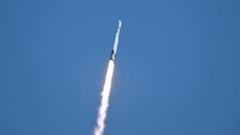
NASA's Europa Clipper Mission to Uncover Secrets of Distant Moon
The groundbreaking Europa Clipper mission sets off to explore one of Jupiter's moons, potentially revolutionizing our understanding of extraterrestrial life.
A spacecraft dedicated to uncovering the secrets of extraterrestrial life has taken off from Cape Canaveral, Florida. NASA's Europa Clipper, a mission long in the making, overcame delays caused by Hurricane Milton and successfully launched at 12:06 local time, embarking on an extensive journey to Europa, one of Jupiter's intriguing icy moons. The objective is to investigate Europa's potential subsurface ocean, which might hold double Earth's water volume and perhaps evidence of simple life forms.
Upon arrival in 2030, the Clipper will orbit Europa, assessing the moon's surface and mysterious plumes of water hypothesized to erupt from its surface. Scientists first suspected Europa could harbor life in the 1970s and got a closer look from Voyager missions and NASA’s Galileo, which revealed a fractured surface rich in life-sustaining compounds.
NASA's Jet Propulsion Laboratory constructed the spacecraft, designed to withstand Europa's harsh radiation and perform over 50 flybys to gather data. Instruments aboard will map the moon's surface and probe beneath its ice shell, drawing comparisons between Europa's icy tectonics and Earth's magma chambers.
The mission will leverage the gravitational pull of Earth and Mars to sling-shot towards its destination since it can't carry sufficient fuel alone. It hopes to beat the European Space Agency's JUICE mission, already en route, with a strategic cosmic piggyback.
Hunting for evidence of life beyond our solar system has broader implications, hinting at life's potential ubiquity across the cosmos. The mission represents a step in space exploration driven by a pure quest for knowledge, emphasizing exploration over profit, according to experts like Mark Fox-Powell of the Open University.
The Europa Clipper is more than a scientific mission; it's a testament to human curiosity and the relentless drive to understand our place in the universe. As it conquers vast distances and overcomes cosmic challenges, it promises to broaden our horizons with each passing mile.









